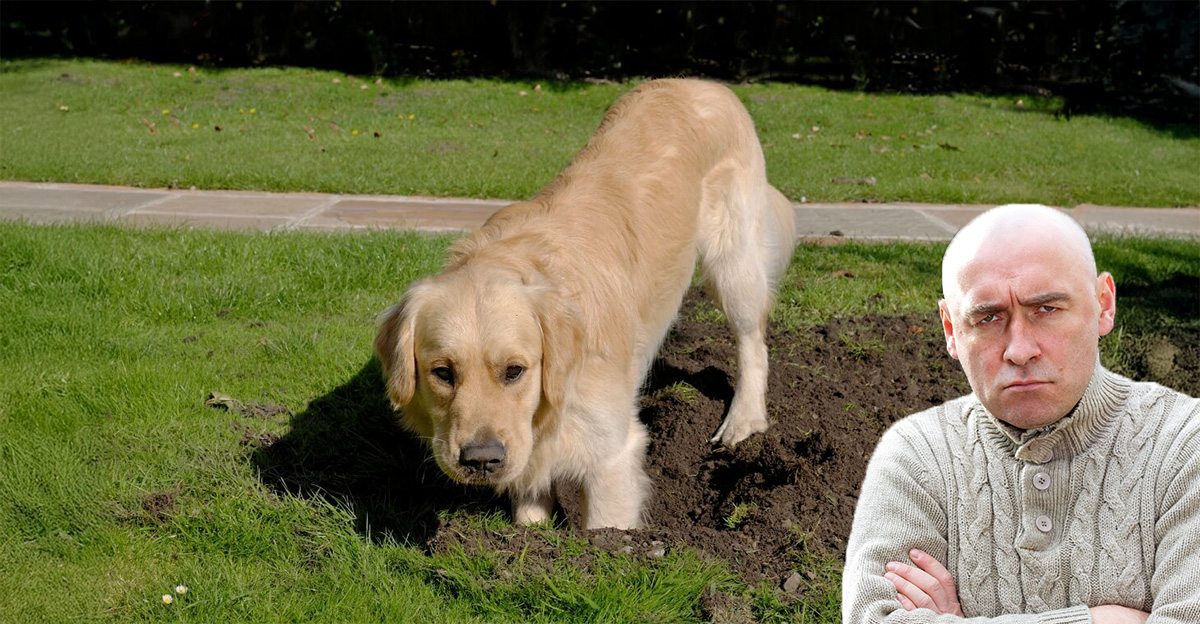Your Neighbor's Dog Tore Up Your Yard. What Next?
So, your neighbor’s dog tore up your yard like it was auditioning for a landscaping horror film. You called your insurance company, but—surprise!—they politely told you “no thanks.” Now you’re left staring at brown patches and a big question: should you take your neighbor to court? Let’s break this down step by step, without boring legal jargon.

The Heart Of The Problem
This isn’t just about grass. It’s about respect, property, and whether you want to spend time, money, and energy chasing a solution. Before you jump to lawsuits, you need to weigh the options like you’re picking a Netflix series: what’s worth the binge, and what’s just too much drama?
What Insurance Actually Covers
Most homeowner’s insurance policies cover your dog, not your neighbor’s. If your pet destroys property or injures someone, your liability coverage may help. But when it’s someone else’s dog doing the damage, their owner’s insurance might be responsible—not yours. That’s why your company told you “sorry.”
Neighbor’s Insurance: A Hidden Ally
If your neighbor has homeowner’s or renter’s insurance, it may cover damage caused by their dog. This is often filed under “personal liability.” If you’re on speaking terms, politely asking them to check with their insurer could turn this into a quick fix.
Step One: Have A Conversation
Court should never be your first step. Knock on the door, explain the damage calmly, and ask for reimbursement. Sometimes, neighbors are genuinely unaware of the chaos their pup has caused. A friendly chat could save you thousands in legal fees.
Document, Document, Document
Before you chat—or certainly before you sue—take photos of the damage. Date them. Keep receipts if you repair or replace anything. Having a paper trail turns “your word against theirs” into “your evidence against their denial.”
When To Get Estimates
You’ll need to show the cost of fixing your yard. Call landscapers, get written estimates, or at least print out receipts for sod, soil, or seed. A clear number makes your case stronger, whether you’re negotiating or filing in small claims court.
Small Claims Court: Your Middle Ground
If your neighbor shrugs you off, small claims court could be your next stop. It’s designed for disputes like this—usually under $10,000 depending on your state. You don’t need a lawyer, and the process is relatively straightforward.
 Photo By: Kaboompics.com, Pexels
Photo By: Kaboompics.com, Pexels
What You Can Sue For
In court, you can ask for the cost of repairs, replacement of damaged property (say, outdoor furniture the dog also chewed), and even court fees. Emotional distress, however, is usually a no-go in yard-damage cases. Sorry—judges aren’t handing out checks for your sadness over lost tulips.
The Costs Of Going To Court
Court fees vary, but expect to pay between $30 and $200 to file. If you win, your neighbor may have to cover those costs. But remember: court takes time. Hearings can drag on, and you’ll be dealing with stress long after the grass grows back.
 Photo By: Kaboompics.com, Pexels
Photo By: Kaboompics.com, Pexels
Mediation: The Friendlier Courtroom
Many counties offer mediation programs. You and your neighbor sit down with a neutral third party who helps you reach an agreement. It’s faster, cheaper, and keeps your relationship from turning into a decades-long feud where you glare across the fence.
State And Local Laws Matter
Some states have specific “dog damage” or “animal trespass” statutes. Local leash or fence ordinances may also strengthen your case. A quick search on your city or county website could reveal rules that swing things in your favor.
Don’t Forget HOA Rules
If you live in an HOA community, check the bylaws. Some associations fine homeowners whose pets cause property damage. That means the HOA could pressure your neighbor to pay up without you lifting a legal finger.
When It’s Really Worth Suing
Court makes sense if the damage is substantial—say, thousands of dollars in landscaping or property repair. If we’re talking about $50 in patchy grass seed, you might spend more on the lawsuit than the actual fix.
When To Let It Go
Sometimes, the best answer is grabbing a bag of soil, reseeding the lawn, and moving on. Lawsuits can sour neighborly relationships permanently. If you’re planning to live next to this person for years, peace might be more valuable than perfect grass.
Talking Long-Term Prevention
Once the damage is handled, prevention is key. You might ask your neighbor to keep the dog leashed, fix their fence, or split the cost of new fencing. Written agreements can prevent repeat episodes of “Canine vs. Kentucky Bluegrass.”
 PROSPER MBEMBA KOUTIHOU, Pexels
PROSPER MBEMBA KOUTIHOU, Pexels
What If The Dog Keeps Coming Back?
If the neighbor ignores you and the dog keeps wrecking your yard, call animal control. Repeated trespassing may violate local animal laws, and authorities can issue warnings or fines.
What Not To Do
Tempted to spray repellents, plant thorny bushes, or worse, take revenge on the pup? Don’t. Courts (and society) frown on harming animals. Stick to legal solutions—you want to solve the problem, not create a criminal record.
Keeping Your Cool Pays Off
Neighbors who stay calm and reasonable often come out ahead in disputes. Judges, mediators, and even insurance adjusters are more likely to side with the person who documented damage, tried to negotiate, and kept things civil.
A Realistic Expectation Check
Winning in court doesn’t guarantee quick cash. If your neighbor doesn’t voluntarily pay, you may need to garnish wages or put a lien on property—more hassle than a freshly seeded yard. Factor this in before filing.
Finally: Tell That Dog He's Barking Up The Wrong Tree
So, should you take them to court? Maybe—but only after trying friendlier, cheaper routes first. Courts are like chainsaws: powerful but messy. Sometimes, the humble rake (a conversation and a bit of compromise) does the job just fine. And hey, worst case, you get a great story about the time Fido turned your lawn into a crater.
You May Also Like:
The Weirdest Shark Tank Products
I bought 5 vending machines, but all the snacks expired. Am I stuck with the loss?
























